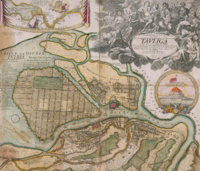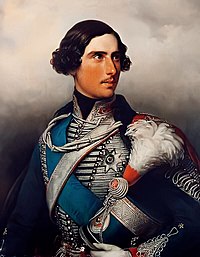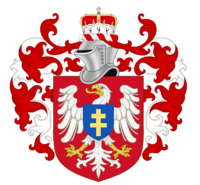Volhynia
Grand Duchy of Volhynia | |
|---|---|
| Anthem: National Anthem of the Grand Duchy of Volhynia | |
| Capital | Prykarpattia |
| Official languages | Sydslavisk |
| Recognised regional languages | Østskandinavien |
| Religion | Orthodox |
| Demonym(s) | Volhynian |
| Government | Unitary Parliamentary Constitutional Monarchy |
| Grand Duke Vasil Kovah-Zydik III | |
| Milka Burak | |
| Legislature | Parliament of the Grand Duchy of Volhynia |
| Council of State | |
| Chamber of Deputies | |
| Independence from Ahrana | |
• Duchy of the Volhynians proclaimed | 1307 |
• Ahranian vassalisations | 1507 |
• Grand Duchy created | 1565 |
• Independence from Ahrana | 1912 |
| Area | |
• Total | 229,900 km2 (88,800 sq mi) |
| Population | |
• 2020 estimate | 16,450,000 |
• Density | 71/km2 (183.9/sq mi) |
| GDP (nominal) | 2020 estimate |
• Total | 329,000,000,000 (25th) |
• Per capita | 20,000 (23rd) |
| Currency | Volhynian Kroner (₮) (VKR) |
This article or section is in the process of an expansion or major restructuring. You are welcome to assist in its construction by editing it as well. If this article or section has not been edited in several days, please remove this template. If you are the editor who added this template and you are actively editing, please be sure to replace this template with {{in use}} during the active editing session. Click on the link for template parameters to use.
This article was last edited by Zhousheng (Fjana) (talk | contribs) 12 months ago. (Update timer) |
Volhynia, or formally the Grand Duchy of Volhynia, is a country located in mid Argis, in the Argic Great Lakes region, bordering Uppsund to the west, Dazhdinia and Littland to the east. Volhynia is located on the Intrian Sea. It has a population of 16.4 million Volhynians, with a population density of 71 people per square kilometer. Volhynia's capital and largest city is Prykarpattia.
Volhynia is a Constitutional Monarchy, led by a hereditary Grand Duke, the Chancellor of Volhynia, who is elected from the Federal Assembly to serve at the Grand Dukes pleasure. Volhynia gained independence from Ahrana in 1912, after several centuries of Ahranaian subjugation which followed Ahranaian vassalisations of shattered Volhynian duchies.
Volhynia's economy is largely agricultural across the majority of the nation, though with oil and mineral extraction in certain regions also providing a large amount of the country's economic output. In urban and coastal regions, the economy is largely service based, with expanding financial and information technology sectors.
History
Middle Ages
By 1304 the two lands, Volhynia and Polotsk, that make up present day Volhynia were prosperous, trading with nearby kingdoms and the advent of new shipping technologies allowed communication and trade across Argis. In that year the Prince of Volhynia, Prince Vasili II, united the two lands under the House of Volhynia creating the first Duchy of Volhynia. Quickly he conquered all the way to the coast, benefiting heavily from the increased trade across the Intrian sea. Vasili would quickly conquer the rest of Polotsk lands, making it all the way to the now called Amber Lake.
Over the next two centuries, the Duchy suffered from famines and incursions by Neighbours. However, in 1464 the young Duke Kristian III was crowned. Kristian was seen as a great unifier of the differing cultures of the Duchy, which had Slavic and Scandi Peoples throughout the land. He soon won wars against neighbours in Dazhdinia, reclaiming Pikolan for the Ducal crown. Kristian had 6 children, 4 sons to which he granted Duchies in his will, and two daughters. One daughter, Hilda, was married to the Ahranaian heir to the throne, and later mothered the future king of Ahrana, and the other Christina, who was married to Prince Bertulis of the Kingdom of Yalivia. Against the advice of his sons, Kristian also granted Prince Bertulis the Duchy of Pikolan, as long as it remained a part of the Duchy for as long as the Duchy may exist. Kristian died in 1498, granting the title of King to his eldest son, Harald. Harald was unpopular among his siblings, as he demanded they pay large taxes to the crown, to finance his failing attempts to settle further inland. In 1500 the brothers decided to stage a coup against the duke and place the second-eldest Eric in his place. The coup failed, and Harald attempted to revoke his brothers' duchies. This failed and led to wars of independence against the Volhynian crown. By 1504 the Duchy was dissolved and became part of the ailing Empire of Ahrana.
Ahranaian Era
In 1504 the new Kingdom of Ahrana gained full control over the land of Volhynia, this was brought about by the Ahranaian King's mother, Hilda, daughter of Krisitan III, which gave the Ahranaian King a claim to the Volhynian lands. The King gained control of these lands through careful diplomacy and threats against those who didn't give in. The Duke of Pikolan, realising that he was next to be forced into Ahranaian control, swore fealty to his homeland of Yalivia, however the Yalivian King was afraid of an Ahranaian invasion and declined him. Soon after Pikolan too fell to the Ahranaian crown, and without a single war declared, Volhynia was again under a single flag. The Dukes were initially skeptical of Ahranaian rule, however soon would grow to be pleased by the protection and economic support that the Kingdom provided.
In 1564 the Volhynian duchies came under the Principality of Uppsund, which was created by King Alexander II of Ahrana for his son. The dukes were skeptical of this, having been directly beneath the King meant that a smaller proportion of their income was paid in taxes, but would now have to pay the Prince of Uppsund too. This created a rift between the Prince of Uppsund and the Volhynian dukes, who also felt that their guarantee of the preservation of Volhynian and the other cultures in Volhynian lands, guaranteed by the King, would also come under threat. To ease these concerns, the Prince of Uppsund created the Grand Duchy of Volhynia, containing all the former Volhynia duchies except for Pikolan. The title of Grand Duke was initially offered to Duke Lushanko of Polotsk, but because of his declining health and uncertain inheritance, he declined the offer and instead suggested Duke Karl of Cisvilia. Karl was called to the court of the Prince of Uppsund in November 1565 and was crowned the Grand Duke over the next few days, with his now adult son Friedrich to be heir. Unfortunately, on his return to Volhynia from Uppsund Karl contracted pneumonia from the winter cold and died within a week. Pyter, having been heir to a throne that existed for less than a month, was crowned Grand Duke in Prykarpattia.
Pyter quickly went about organizing his new realm, granting positions in his court, and establishing the beginnings of a navy to crack down on piracy in the Intrian sea. Pyter would marry the daughter of the King of Ahrana, solidifying his family's place in Ahranaian nobility even further. Pyter would go on to expand Volhynian’s borders northward, the land north of the duchies was sparsely populated, and no real nation had laid claim to the lands in centuries. Pyter jumped at the chance, hoping to extend Transbaltia to the northern lakes. By 1579 he had done just that, and he established settlements along the newly claimed coast, the most notable being Ryazan, which would grow to be the Grand Duchy's third-largest city. He also embarked on a task to construct a large system of roads and canals across Volhynia, he succeeded with his road construction, connecting Prykarpattia to Ryazan by 1585 in part thanks to loans he took from the Ahranaian crown, but his ambition to connect the Intrian sea and the northern lakes via a canal connecting two of the nation's largest rivers was never completed in his lifetime, as he was killed in battle in 1582 during a border conflict near Dazhdinia.
In 1624 Hermann I was crowned Grand Duke, the grandson of Pyter, he was also the grandson of the immensely wealthy Ahranaian, Luca Romano. In 1615 when Romano died, he left an immense sum to all his grandchildren, but an especially large sum to his grandson Hermann, who had been his apprentice in the final years of his life. In the port cities of Argis, Hermann would look upon his grandfather as he negotiated with Kings and merchants alike, this gave the young Hermann a taste for business which he would use during his reign to bring great wealth to cities such as Prykarpattia and Ryazan. Hermann would travel the world during his reign, establishing a merchant navy to trade everything from Ice to spices. Hermann succeeded in fulfilling his other grandfather's dream of building a canal connecting the Intrian and the northern lakes, however it could only support river barges, and whilst for the time that was sufficient for trade, as demand increased so did the size of ships transport goods, which quickly outgrew the canal.
Independence from Ahrana
In 1911 the nationalists took power in Ahrana, and within a year they abolished the monarchy and established an authoritarian regime, labelled a republic. This caused widespread panic across all the states of Ahrana, leading to the independence of many of its states such as Elde and Uppsund. The newly nationalist Ahranaian army maintained a military presence in Volhynia, designed to protect its eastern borders, it would now be used to take control of dissenting regions. The 4th and 7th Ahranaian Infantry corps were stationed near to the Dazhdidnian border, led by Generals Aleksander Tuschkov and Pietro Zuchevski respectively. Zuchevski was a staunch supporter of the nationalist cause, and upon hearing of Elde and Uppsund's declarations of independence he decided to march the 7th Infantry corps to Prykarpattia to dissuade any attempts of secession. Tuschkov on the other hand was born in Polotsk, and was loyal to the Ahranaian crown, and initially warned several royal ministers and generals of a nationalist coup. Tuschkov upon hearing of Zuchevski's plans also moved to position his army in Prykarpattia, where he would join forces with the Volhynian army and marine brigades.
Though before either army could arrive in Prykarpattia, Grand Duke Pyter III signed the Volhynian Declaration of Independence, which the Declaration was introduced by the Exiled Ahranaian Monarch, revoking any ties or obligations of Volhynia to Ahrana, and establishing it as an independent state. Though General Tuschkov initially hoped that Transbaltia would remain in Ahranaian hands, he feared the nationalists to be the greater of two evils and pledged to support their independence from the nationalist regime.
Celebrations began in Prykarpattia following the declaration, but when news spread of the approaching Ahranaian army panic ensued, the newly independent government estimated that they had a week before the 7th army arrived and began preparations for the evacuation and defense of the city. The Volhynian garrison in Prykarpattia had already contacted Tuschkov, however the 4th army would arrive in the city after Zuchevski's. Overnight thousands of people fled the capital, along with hundreds of paintings and valuables from Prykarpattia’s palaces. Within five days near only the garrison remained in the city, guarding the city's forts, and patrolling the medieval city walls. The 7th army arrived in the early morning of August 19th and began bombarding the city with towed artillery.
Within hours much of the city's outskirts were devastated, however by midday, the 4th corps unexpectedly arrived catching Zuchevski off guard, what insued was a blood bath, with Prykarpattia and loyal Ahranaian destroying the nationalist army within days. Zuchevski was later captured by Volhynian forces in Polotsk however he escaped, and eventually made his way back to Ahrana. The 19th of August is remembered as defiance day and is celebrated annually.
All Volhynian’s states ratified the Declaration of independence but one, the Duchy of Pikolan. The Duchy had long sought independence from Volhynia, and to be made an individual state of Ahrana. The Duchy of Pikolan thanks to the exiled Ahranaian Monarch were also granted Independence from Ahrana and Volhynia due to the Ahranaian Monarch understanding the ethnic differences. In addition to Pikolan being granted Independence the northern territories of Volhynia above the Duchy of Polotsk, the land that borders the Amber Lake, was granted Independence from Ahrana and Volhynia respectively.
Politics
The Government of the Grand Duchy of Volhynia is a Unitary Parliamentary Constitutional Monarchy which was first established in 1307 by Royal Decree by the Ahranaian King, ??Unknown King??, for his youngest son, Prince ??Unknown Prince??. The Duchy was elevated to Grand Duchy Status in 1565 by Royal Decree by another Ahranaian King, ??Unknown King??, for the Duke of Volhynia's support through the wars of ??Unknown War name and time??.
The Executive Level of the Government is made up of two offices, the Grand Duke, and the Chancellor. Both are subject to the People and the Constitution of the Grand Duchy which was adopted in 1805 creating an Official Constitutional Monarchy in Volhynia.
Grand Duke
The Grand Duke of Volhynia is the Head of State who serves in a ceremonial position but does hold some reserve powers in government to be used with the Grand Duke deems necessary. The current House that holds the seat of Grand Duke is the House of Kovach-Zydik, which has held the seat of Grand Duke since 1825. The Grand Duke signs any Law sent by the Parliament and the Government to sign into Law, receives all Foreign Ambassadors and Visitors to Volhynia, Commander-in-Chief of the Volhynian Armed Forces, receives the resignation of the government and can call for the resignation of the government and early election. The Grand Duke is above the Executive Government and is considered to be separate from the Executive to allow an impartial authority to exist.
Chancellor
The Chancellor of the Grand Duchy of Volhynia is the Head of Government of the Executive, holding the Constitutitonal authority to run the Grand Duchy on a daily basis with the support of the Grand Duke. The Chancellor is elected by the people in a Parliamentary Election, or in some instances an Emergency Election, for a four-year term that has no restriction on serving consecutive terms. The Chancellor does not have to be a member of the Ducal Parliament, but a person does need to be of the age of at least twenty-five years old to hold th office of Chancellor.
Legislative
The Parliament of the Grand Duchy of Volhynia is a bicameral legislature that has full legislative authority over all lands of the Grand Duchy of Volhyina. The Legislature is made up of the Council of State and the Chamber of Deputies. Both Chambers of Parliament are the full legislative authority at the Federal Level of the Grand Duchy.
Council of State
The Council of State is composed up of thirty-five members that are elected by the people to serve a six-year term renewable two times total. The Council of State acts as the Upper Chamber of Parliament giving it the power to determine where the Governments budget is applied and how it is used, final decision on any Acts of War, oversees any Impeachment Trial of a Chancellor or Executive Minister of Government, and has final say on the final round of Government appointees and Judicial Justices.
To be a member of the Council of State a person must be between the ages of twenty-one to sixty-five years old, no criminal convictions, have a majority of the vote from a Parliamentary Election, and not be a member of a Regional Government upon taking the oath of office (this also includes and applies to anyone hold federal office). In addition to these requirements, it is not required to be a member of a Political Organization to hold a seat in the Council of State which is the only Chamber of the Parliament where most of its members are Independent from Party Politics.
Chamber of Deputies
The Chamber of Deputies is composed up of one hundred and fifty Deputies that are elected by the people to serve a six-year term renewable two times total. The Chamber of Deputies acts as the Lower Chamber of Parliament making it the Chamber of the People. The Chamber of Deputies drafts all Laws, Constitutional Amendments, Declarations of War or Peace, enact a Military Draft for the Armed Forces of the Grand Duchy, and hold a joint Committee with the Council of State over the Government Budget.
Judicial
The Judicial section of the government of the Grand Duchy is made up of three separate Judicial Administrations; Constitutional, Private, Administration. The court structure is done as the following: Constitutional Court, Justices of the Peace, District Tribunals, Superior Court of justice, Social Justice Courts, and the Administrative Courts.
Each Court in the Judicial are independent from the other levels of government including Regional Government in addition to each other. Each Court is headed by a three justice or judge Pannel who serve a fifteen year term not renewable, unless in extreme cases such as War, Occupation and so forth.










